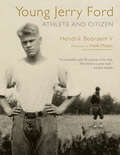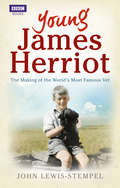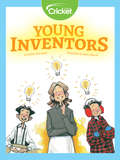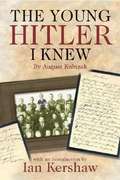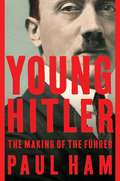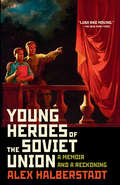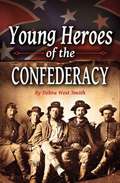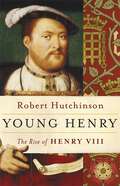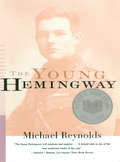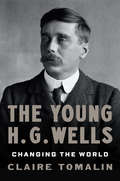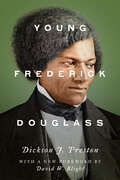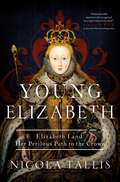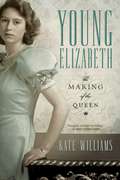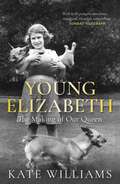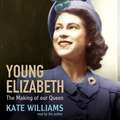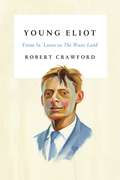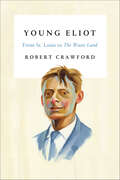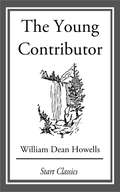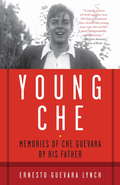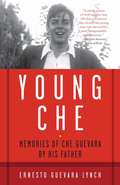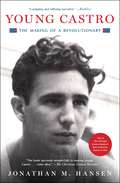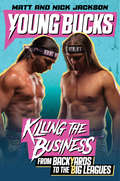- Table View
- List View
Young Jerry Ford: Athlete and Citizen
by Hendrik Booraem V Hank MeijerRare has been the president whose life blended the individual drive that propels one to high office with the social responsibility of being an exemplary person. Gerald R. Ford (1913-2006) was one of those rare men.In this biography Hendrik Booraem traces the early life of Gerald Ford in Grand Rapids, Michigan, to his high school graduation in 1931, showing how he developed the outlook and ideals that he brought to the White House. Ford's childhood offers telling glimpses of family and school, sports and recreation, and Western Michigan life in the Jazz Age and the Depression. Amply illustrated with photos from the 1920s and '30s, Young Jerry Ford shows the 38th President of the United States in a new and colorful light.
Young James Herriot: The Making of the World’s Most Famous Vet
by John Lewis-StempelSet in Glasgow in the 1930s, Young James Herriot is the fascinating story of Herriot’s formative years at veterinary college, recounting the tales behind his calling to work with animals and his early friendships. With no modern drugs, and a lot of trial-and-error, James sets about learning how to treat the local farm animals and the pets of city folk.Accompanied by a cast of eccentric professors and an ensemble of aspiring veterinarians, this book reveals a world now lost to us, showing how life in pre-war Britain changed an enthusiastic young student named Alf Wight into the man who would charm millions of readers the world over.
Young Inventors
by Kathie MacIsaacKids have always had amazing ideas, like how to keep your ears warm on a cold winter day or an icy treat to enjoy on a hot summer day. Learn about four young inventors and their inventions that helped to change people's lives.
The Young Hitler I Knew
by August Kubizek Geoffrey Brooks Ian KershawThis is the first edition to be published in English since 1955 and it corrects many changes made for reasons of political correctness. It also includes important sections which were excised from the original English translation. August Kubizek met Adolf Hitler in 1904 while they were both competing for standing room at the opera. Their mutual passion for music created a strong bond, and over the next four years they became close friends. Kubizek describes a reticent young man, painfully shy, yet capable of bursting into hysterical fits of anger if anyone disagreed with him. The two boys would often talk for hours on end; Hitler found Kubizek to be a very good listener, a worthy confidant to his hopes and dreams. In 1908 Kubizek moved to Vienna and shared a room with Hitler at 29 Stumpergasse. During this time, Hitler tried to get into art school, but he was unsuccessful. With his money fast running out, he found himself sinking to the lower depths of the city: an unkind world of isolation and 'constant unappeasable hunger'. Hitler moved out of the flat in November, without leaving a forwarding address; Kubizek did not meet his friend again until 1938. The Young Hitler I Knew tells the story of an extraordinary friendship, and gives fascinating insight into Hitler's character during these formative years. A must for Hitler scholars.
Young Hitler: The Making Of The Führer
by Paul HamBy looking deeply into the Führer's childhood, war experiences, and early political career, this rigorous narrative seeks to answer this question: How did the early, defining years of Hitler’s life affect his rise to power? When Adolf Hitler went to war in 1914, he was just 25 years old. It was a time he would later call the “most stupendous experience of my life.” That war ended with Hitler in a hospital bed, temporarily blinded by mustard gas. The world he eventually opened his newly healed eyes to was new and it was terrible: Germany had been defeated, the Kaiser had fled, and the army had been resolutely humbled. Hitler never accepted these facts. Out of his fury rose a white-hot hatred, an unquenchable thirst for revenge against the “criminals” who had signed the armistice, the socialists he accused of stabbing the army in the back, and, most violently, the Jews—a direct threat to the master race of his imagination—on whose shoulders he would pile all of Germany’s woes. By peeling back the layers of Hitler’s childhood, his war record, and his early political career, Paul Ham’s Young Hitler: The Making of the Führer seeks the man behind the myth. More broadly, Paul Ham seeks to answer the question: Was Hitler’s rise to power an extreme example of a recurring type of demagogue—a politician who will do and say anything to seize power; who thrives on chaos; and who personifies, in his words and in his actions, the darkest prejudices of humankind?
Young Heroes of the Soviet Union: A Memoir and a Reckoning
by Alex HalberstadtIn this &“urgent and enthralling reckoning with family and history&” (Andrew Solomon), an American writer returns to Russia to face a family history that still haunts him. Can trauma be inherited? It is this question that sets Alex Halberstadt off on a quest to name and acknowledge a legacy of family trauma, and to end a century-old cycle of estrangement. His search takes him across the troubled, enigmatic land of his birth. In Ukraine he tracks down his paternal grandfather—most likely the last living bodyguard of Joseph Stalin—to reckon with the ways in which decades of Soviet totalitarianism shaped three generations of his family. He visits Lithuania, his Jewish mother&’s home, to examine the legacy of the Holocaust and pernicious anti-Semitism that remains largely unaccounted for. And he returns to his birthplace, Moscow, where his glamorous grandmother designed homespun couture for Soviet ministers&’ wives, his mother consoled dissidents at a psychiatric hospital, and his father made a dangerous living dealing in black-market American records. Along the way, Halberstadt traces the fragile and indistinct boundary between history and biography. Finally, he explores his own story: that of an immigrant who arrived in America, to a housing project in Queens, New York. A now fatherless ten-year-old boy struggling with identity, rootlessness, and a yearning for home, he became another in a line of sons who grew up separated from their fathers by the tides of politics and history. As Halberstadt revisits the sites of his family&’s formative traumas, he uncovers a multigenerational transmission of fear, suspicion, melancholy, and rage. And he comes to realize something more: Nations, like people, possess formative traumas that penetrate into the most private recesses of their citizens&’ lives.
Young Heroes of the Confederacy
by Debra West SmithThe Civil War is a topic well-known to readers of all ages. However, it is the bravery and strength of the young men and women that is often forgotten. Born into a set of circumstances beyond their control, these children of the 1860s faced the ultimate test of character and courage. Stories of courage in the face of starvation and death, told through biographies of young people from each of the Confederate states, reveals just what kind of heroes they were.
A Young Hero with a Big Heart: The Story of Ana Dodson (Fountas & Pinnell LLI Gold #Level P)
by Barbara FiermanA Young Hero with a Big Heart: The Story of Ana Dodson
Young Henry: The Rise of Henry VIII
by Robert HutchinsonCompelling account of the first 35 years of a magnificent and ruthless monarch.Henry became the unexpected heir to the precarious Tudor throne in 1502, after his elder brother Arthur died. He also inherited both his brother's wardrobe and his wife, the Spanish princess Katherine of Aragon. He became king in April 1509 with many personality traits inherited from his father - the love of magnificence, the rituals of kingship, the excitement of hunting and gambling and the construction of grand new palaces. After those early glory days of feasting, fun and frolic, the continuing lack of a male Tudor heir runs like a thin line of poison through Henry's reign. After he fell in love with Anne Boleyn, he gambled everything on her providing him with a son and heir. From that day forward everything changed.Based on contemporary accounts, Young Henry provides a compelling vision of the splendours, intrigues and tragedies of the royal court, presided over by the ruthless and insecure Henry VIII. With his customary scholarship and narrative verve, Robert Hutchinson provides fresh insights into what drove England's most famous monarch, and how this happy, playful Renaissance prince was transformed into the tyrant of his later years.
The Young Hemingway
by Michael Reynolds"The Young Hemingway will entertain and surprise. Not only is it a significant contribution to Hemingway critical biography, but it should rank as one of the best nonfiction books of the year."--Los Angeles Times Michael Reynolds recreates the milieu that forged one of America's greatest and most influential writers. He reveals the fraught foundations of Hemingway's persona: his father's self-destructive battle with depression and his mother's fierce independence and spiritualism. He brings Hemingway through World War I, where he was frustrated by being too far away from the action and glory, despite his being wounded and nursed to health by Agnes Von Kurowsky--the older woman with whom he fell terribly in love.
The Young H. G. Wells: Changing the World
by Claire TomalinFrom acclaimed literary biographer Claire Tomalin, a complex and fascinating exploration of the early life of the influential writer and public figure H. G. WellsHow did the first forty years of H. G. Wells's life shape the father of science fiction?From his impoverished childhood in a working-class English family and determination to educate himself at any cost to his complicated marriages, love affair with socialism, and the serious ill health that dominated his twenties and thirties, H. G. Wells's extraordinary early life would set him on a path to become one of the world's most influential writers. The sudden success of The Time Machine and The War of the Worlds transformed his life and catapulted him to international fame; he became the writer who most inspired Orwell and countless others and predicted men walking on the moon seventy years before it happened.In this remarkable, empathetic biography, Claire Tomalin paints a fascinating portrait of a man like no other, driven by curiosity and desiring reform, a socialist and a futurist whose new and imaginative worlds continue to inspire today.
Young Frederick Douglass
by Dickson J. Preston"No one working on Douglass should leave home without a copy of this book."—from the foreword by David W. Blight, Pulitzer Prize winning author of Frederick Douglass: Prophet of FreedomDrawing on previously untapped sources, Young Frederick Douglass recreates with fidelity and in convincing detail the background and early life of the man who was to become "the gadfly of America’s conscience" and the undisputed spokesman for nineteenth-century black Americans.With a new foreword by renowned Douglass scholar David W. Blight, Dickson J. Preston’s highly regarded biography traces the life and times of Frederick Douglass from his birth on Maryland’s Eastern Shore in 1818 until 1838, when he escaped from slavery to emerge upon the national scene. Astounding his white contemporaries with his oratorical brilliance and intellectual capabilities, Douglass dared to challenge the doctrine of white supremacy on its own grounds. At the time of Douglass’s death in 1895, one eulogist wrote that he was probably the best-known American throughout the world since Abraham Lincoln.
Young Elizabeth: Elizabeth I and Her Perilous Path to the Crown
by Nicola TallisThe first definitive biography of the young Elizabeth I in over twenty years—drawing on a rich variety of primary sources—tracing her tumultuous path to the crown.Queen Elizabeth I is renowned for her hugely successful reign that makes her, perhaps, the most celebrated monarch in English history. But what of the trials she faced in her challenging early life? Her status as a princess didn&’t last long—when she was less than three years old, her mother—the infamous Anne Boleyn—was brutally beheaded and Elizabeth was relegated to the title of bastard. After losing several stepmothers, she then faced predatory attentions and illicit flirtations from her stepfather, Thomas Seymour, which ultimately forced Elizabeth to leave her home. But these were only the beginning of Elizabeth&’s problems. Later, she became implicated in a plot to overthrow her half-sister, Mary, and faced interrogation and imprisonment in the very tower in which her mother died. Adamantly protesting her innocence, Elizabeth endured the interrogation and was eventually released. Her popularity as a royal increased from that point on, and she finally became queen at the age of twenty-five. Expert historian Nicola Tallis draws on a variety of primary sources—from the queen herself as well as those closest to her—to provide an extensive and thorough study of the Virgin Queen&’s perilous journey to the crown. Looking at Elizabeth as a human being rather than a political chess piece, her narrative explores the dangers and tragedies that plagued Elizabeth's early life, revealing the queen to be a young women who drew strength from her various plights as she navigated one of the most thrilling paths to the throne in the history of the monarchy.
Young Elizabeth: The Making Of The Queen
by Kate WilliamsWe can hardly imagine a Britain without Elizabeth II on the throne. It seems to be the job she was born for. And yet for much of her early life the young princess did not know the role that her future would hold. She was our accidental Queen. Elizabeth's determination to share in the struggles of her people marked her out from a young age. Her father initially refused to let her volunteer as a nurse during the Blitz, but relented when she was 18 and allowed her to work as a mechanic and truck driver for the Women's Auxiliary Territorial Service. It was her forward-thinking approach that ensured that her coronation was televised, against the advice of politicians at the time. Kate Williams reveals how the 25-year-old young queen carved out a lasting role for herself amid the changes of the 20th century. Her monarchy would be a very different one to that of her parents and grandparents, and its continuing popularity in the 21st century owes much to the intelligence and elusive personality of this remarkable woman.
Young Elizabeth: The Making of our Queen
by Kate WilliamsThe story of how Elizabeth II became queen.We can hardly imagine a Britain without Elizabeth II on the throne. It seems to be the job she was born for. And yet for much of her early life the young princess did not know the role that her future would hold. She was our accidental Queen.As a young girl, Elizabeth was among the guests in Westminster Abbey watching her father being crowned, making her the only monarch to have attended a parent's coronation. Kate Williams explores the sheltered upbringing of the young princess with a gentle father and domineering mother, her complicated relationship with her sister, Princess Margaret, and her dependence on her nanny, Marion 'Crawfie' Crawford. She details the profound and devastating impact of the abdication crisis when, at the impressionable age of 11, Elizabeth found her position changed overnight: no longer a minor princess she was now heiress to the throne.Elizabeth's determination to share in the struggles of her people marked her out from a young age. Her father initially refused to let her volunteer as a nurse during the Blitz, but relented when she was 18 and allowed her to work as a mechanic and truck driver for the Women's Auxiliary Territorial Service. It was her forward-thinking approach that ensured that her coronation was televised, against the advice of politicians at the time.Kate Williams reveals how the 25-year-old young queen carved out a lasting role for herself amid the changes of the 20th century. Her monarchy would be a very different one to that of her parents and grandparents, and its continuing popularity in the 21st century owes much to the intelligence and elusive personality of this remarkable woman.
Young Elizabeth: The Making of our Queen
by Kate WilliamsWe can hardly imagine a Britain without Elizabeth II on the throne. It seems to be the job she was born for. And yet, for much of her early life, the young princess did not know the role that her future would hold. She was our accidental Queen.As a young girl, Elizabeth was among the guests in Westminster Abbey watching her father being crowned, making her the only monarch to have attended a parent's coronation. Kate Williams explores the sheltered upbringing of the young princess, with a gentle father and domineering mother, her complicated relationship with her sister, Princess Margaret, and her dependence on her nanny, Marion 'Crawfie' Crawford. She details the profound and devastating impact of the abdication crisis, when, at the impressionable age of eleven, Elizabeth found her position changed overnight: no longer a minor princess she was now heiress to the throne.Elizabeth's determination to share in the struggles of her people marked her out from a young age. Her father initially refused to let her volunteer as a nurse during the Blitz, but relented when she was eighteen and allowed her to work as a mechanic and truck driver for the Women's Auxiliary Territorial Service. It was her forward-thinking approach that ensured that her coronation was televised, against the advice of politicians at the time.Kate Williams reveals how the 25-year-old young Queen carved out a lasting role for herself amid the changes of the twentieth century. Her monarchy would be a very different one to that of her parents and grandparents. And its continuing popularity in the twenty-first century owes much to the intelligence and elusive personality of this remarkable woman.This audio edition is read by the author.(p) 2012 Orion Publishing Group
Young Eliot: From St. Louis to the Waste Land
by Robert CrawfordOn the fiftieth anniversary of the death of T. S. Eliot, the award-winning biographer Robert Crawford presents us with the first volume of a comprehensive account of this poetic genius. Young Eliot traces the life of the twentieth century's most important poet from his childhood in St. Louis to the publication of his revolutionary poem The Waste Land. Crawford provides readers with a new understanding of the foundations of some of the most widely read poems in the English language through his depiction of Eliot's childhood—laced with tragedy and shaped by an idealistic, bookish family in which knowledge of saints and martyrs was taken for granted—as well as through his exploration of Eliot's marriage to Vivien Haigh-Wood, a woman who believed she loved Eliot "in a way that destroys us both." <P><P> Quoting extensively from Eliot's poetry and prose as well as drawing on new interviews, archives, and previously undisclosed memoirs, Crawford shows how the poet's background in Missouri, Massachusetts, and Paris made him a lightning rod for modernity. Most impressively, Young Eliot reveals the way he accessed his inner life—his anguishes and his fears—and blended them with his omnivorous reading to create his masterpieces "The Love Song of J. Alfred Prufrock" and The Waste Land. At last, we experience T. S. Eliot in all his tender complexity as student and lover, penitent and provocateur, banker and philosopher—but most of all, Young Eliot shows us as an epoch-shaping poet struggling to make art among personal disasters.
Young Eliot: From St. Louis to The Waste Land
by Robert CrawfordA groundbreaking new biography of one of the twentieth century's most important poetsOn the fiftieth anniversary of the death of T. S. Eliot, the award-winning biographer Robert Crawford presents us with the first volume of a comprehensive account of this poetic genius. Young Eliot traces the life of the twentieth century's most important poet from his childhood in St. Louis to the publication of his revolutionary poem The Waste Land. Crawford provides readers with a new understanding of the foundations of some of the most widely read poems in the English language through his depiction of Eliot's childhood—laced with tragedy and shaped by an idealistic, bookish family in which knowledge of saints and martyrs was taken for granted—as well as through his exploration of Eliot's marriage to Vivien Haigh-Wood, a woman who believed she loved Eliot "in a way that destroys us both." Quoting extensively from Eliot's poetry and prose as well as drawing on new interviews, archives, and previously undisclosed memoirs, Crawford shows how the poet's background in Missouri, Massachusetts, and Paris made him a lightning rod for modernity. Most impressively, Young Eliot reveals the way he accessed his inner life—his anguishes and his fears—and blended them with his omnivorous reading to create his masterpieces "The Love Song of J. Alfred Prufrock" and The Waste Land. At last, we experience T. S. Eliot in all his tender complexity as student and lover, penitent and provocateur, banker and philosopher—but most of all, Young Eliot shows us as an epoch-shaping poet struggling to make art among personal disasters.
The Young Eagle: The Rise Of Abraham Lincoln
by Kenneth J. WinkleDrawing on the latest interpretive and methodological advances in historical scholarship, The Young Eagle: The Rise of Abraham Lincoln reexamines the young adult life of America's sixteenth president.
The Young Contributor: From 'Literature and Life'
by William Dean HowellsWilliam Dean Howells (1837-1920) was an American realist author and literary critic. He wrote his first novel, Their Wedding Journey, in 1871, but his literary reputation really took off with the realist novel A Modern Instance, published in 1882, which describes the decay of a marriage. His 1885 novel The Rise of Silas Lapham is perhaps his best known, describing the rise and fall of an American entrepreneur in the paint business. His social views were also strongly reflected in the novels Annie Kilburn (1888) and A Hazard of New Fortunes (1890). While known primarily as a novelist, his short story "Editha" (1905) - included in the collection Between the Dark and the Daylight (1907) - appears in many anthologies of American literature. Howells also wrote plays, criticism, and essays about contemporary literary figures such as Ibsen, Zola, Verga, and, especially, Tolstoy, which helped establish their reputations in the United States. He also wrote critically in support of many American writers. It is perhaps in this role that he had his greatest influence.
Young Clara Barton: Battlefield Nurse
by Sarah AlcottFollows the life of the nurse who served on the battlefields of the Civil War and later founded the American Red Cross.
Young Che
by Ernesto Guevara Lynch"I had prepared a life plan that included ten years of wandering, later years studying medicine. . . . All that's in the past, the only thing that's clear is that the ten years of wandering might grow longer . . . but it will now be of an entirely different type from the one I dreamed of, and when I arrive in a new country it will not be to go to museums and look at ruins, because that still interests me, but also to join the struggle of the people." - Che Guevara, in a letter to his mother, 1956Assembled from two separate books written by Che's father, this is a vivid and intimate account of the formative years of an icon. Ernesto Guevara Lynch describes the people and personal events that shaped the development of his son's revolutionary worldview, from his childhood in a bourgeois Argentinian home to the moment he joined Castro to train for the invasion of Cuba in 1956. It also includes, available for the first time in the United States, Che's diary of his trip around Northern Argentina in 1950. Young Che is an indispensible guide to understanding one of the twentieth century's most famous and enduring revolutionary figures.From the Trade Paperback edition.
Young Che: Memories of Che Guevara by His Father
by Ernesto Guevara Lynch Lucia Alvarez De ToledoAssembled from two separate books written by Che's father, this is a vivid and intimate account of the formative years of an icon. Ernesto Guevara Lynch describes the people and personal events that shaped the development of his son's revolutionary worldview, from his childhood in a bourgeois Argentinian home to the moment he joined Castro to train for the invasion of Cuba in 1956. It also includes, available for the first time in the United States, Che's diary of his trip around Northern Argentina in 1950. "Young Che" is an indispensable guide to understanding one of the twentieth century's most famous and enduring revolutionary figures.
Young Castro: The Making of a Revolutionary
by Jonathan M. HansenAn intimate, revisionist portrait of the early years of Fidel Castro, showing how an unlikely young Cuban led his country in revolution and transfixed the world.This book will change how you think about Fidel Castro. Until now, biographers have treated Castro’s life like prosecutors, scouring his past for evidence to convict a person they don’t like or don’t understand. This can make for bad history and unsatisfying biography. Young Castro challenges readers to put aside the caricature of a bearded, cigar-munching, anti-American hot head to discover how Castro became the dictator who acted as a thorn in the side of US presidents for nearly half a century. These pages show Fidel Castro getting his toughness from a father who survived Spain’s nasty class system and colonial wars to become one of the most successful independent plantation owners in Cuba. They show a boy running around that plantation more comfortable playing with the children of his father’s laborers than his tony classmates at elite boarding schools in Santiago de Cuba and Havana. They show a young man who writes flowery love letters from prison and contemplates the meaning of life, a gregarious soul attentive to the needs of strangers but often indifferent to the needs of his own family. These pages show a liberal democrat who admires FDR’s New Deal policies and is skeptical of communism, but is also hostile to American imperialism. They show an audacious militant who stages a reckless attack on a military barracks but is canny about building an army of resisters. In short, Young Castro reveals a complex man. The first American historian in a generation to gain access to the Castro archives in Havana, Jonathan Hansen was able to secure cooperation from Castro’s family and closest confidants, gaining access to hundreds of never-before-seen letters and to interviews with people he was the first to ask for their impressions of the man. The result is a nuanced and penetrating portrait of a figure who was determined to be a leader—a man at once brilliant, arrogant, bold, vulnerable and all too human. A man who, having grown up on an island that felt like a colonial cage, was compelled to lead his country to independence.
Young Bucks: Killing the Business from Backyards to the Big Leagues
by Matt Jackson Nick JacksonThe electric and daring independent wrestling tag team share their inspiring story of how two undersized, ambitious athletes from Southern California became the idols of millions of popular sports fans, coveted among the ranks of AEW’s elite wrestling lineup. Featuring over 60 photographs and alternating between each brother’s perspective, this entertaining memoir is a complete portrait of what it means to grow into—and give back to—wrestling, the sport and profession they embody and love.Famous for their highflying moves, Superkicks, and viral videos, Matt and Nick Jackson are two of the hottest and most talented competitors in professional wrestling today. Known as the Young Bucks, this pair of ambitious brothers are an inspiration to both fans and aspiring wrestlers worldwide due to their message of resilience and determination. That they are also faithful family men devoted to their loved ones gives them additional appeal.Young Bucks begins in Southern California, where two young boys grew up dreaming of success and fame. Matt and Nick look back on the sacrifices they made to achieve their ambitions, from taking odd jobs to pay for their own wrestling ring to hosting backyard events with friends. They share their joy at being recruited into the independent California wrestling circuit and the work it took to finally make it professionally, and speak frankly about what it means to have the support of millions of fans cheering their talents in arenas nationwide. The Young Bucks talk endearingly about their sport, their faith, and their families, sharing personal reflections and behind-the-scenes anecdotes while paying tribute to the wrestling acts and inspirations that came before them. They also elaborate on this historical time in the evolution of wrestling, as the sport and its culture dramatically change day by day.Told with the brothers’ signature wit and charm, Young Bucks is warm, heartfelt story of hope, perseverance, and undying ambition.
